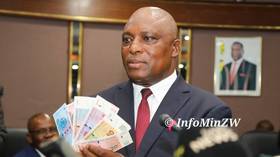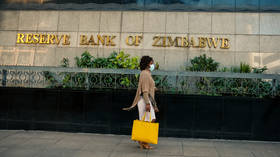Zimbabwe launches ‘gold’ currency to replace dollar

Zimbabwe has introduced a new national currency aimed at stabilizing the economy and countering the devaluation of the local dollar in the southern African nation. Harare has also appealed to the United Nations for $2 billion in aid to help with food insecurity.
The ‘structured currency’ – Zimb Gold (ZiG) – will be anchored mainly on gold and foreign currency reserves, Zimbabwe’s Reserve Bank governor, John Mushayavanhu, announced on Friday while presenting the country’s 2024 monetary policy statement.
“With effect from today, banks shall convert the current Zimbabwe dollar balances to ZiG,” Mushayavanhu said, adding that it “will circulate with other currencies in the basket.”
He stated that the central bank would also implement a market-determined exchange rate.
“If we implement these measures, we expect them to have an impact on inflation,” the governor said.
The Zimbabwean dollar has depreciated against the US dollar every trading day this year and has weakened 72%, making it the world’s second-worst-performing currency, Bloomberg reported late last month. According to the Zimbabwe National Statistics Agency, the country’s annual inflation rate increased to a seven-month high of 55.3% in March, up from 47.6% in February. The rising costs of food and utilities, including housing, were the primary sources of the surge, the agency reported.
On Wednesday, the landlocked country declared a national state of disaster, with President Emmerson Mnangagwa stating that severe droughts will leave more than 2.7 million people without food this year.
In February, Finance Minister Mthuli Ncube stated that the government was considering linking the exchange rate to hard assets, including gold, and establishing a currency board.
The ZiG launch comes nearly a year after the Reserve Bank of Zimbabwe (RBZ) defied an IMF warning and introduced a gold-backed digital currency for peer-to-peer and peer-to-business transactions. Last May, the RBZ announced the sale of gold-backed digital tokens worth approximately $40 million as part of efforts to stabilize the Zimbabwean dollar.
The IMF had warned Harare that the issuance of such tokens comes with “macroeconomic and financial stability risks, legal and operational risks, and governance risks” that must be thoroughly evaluated.













